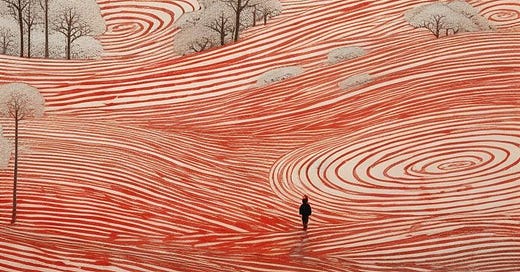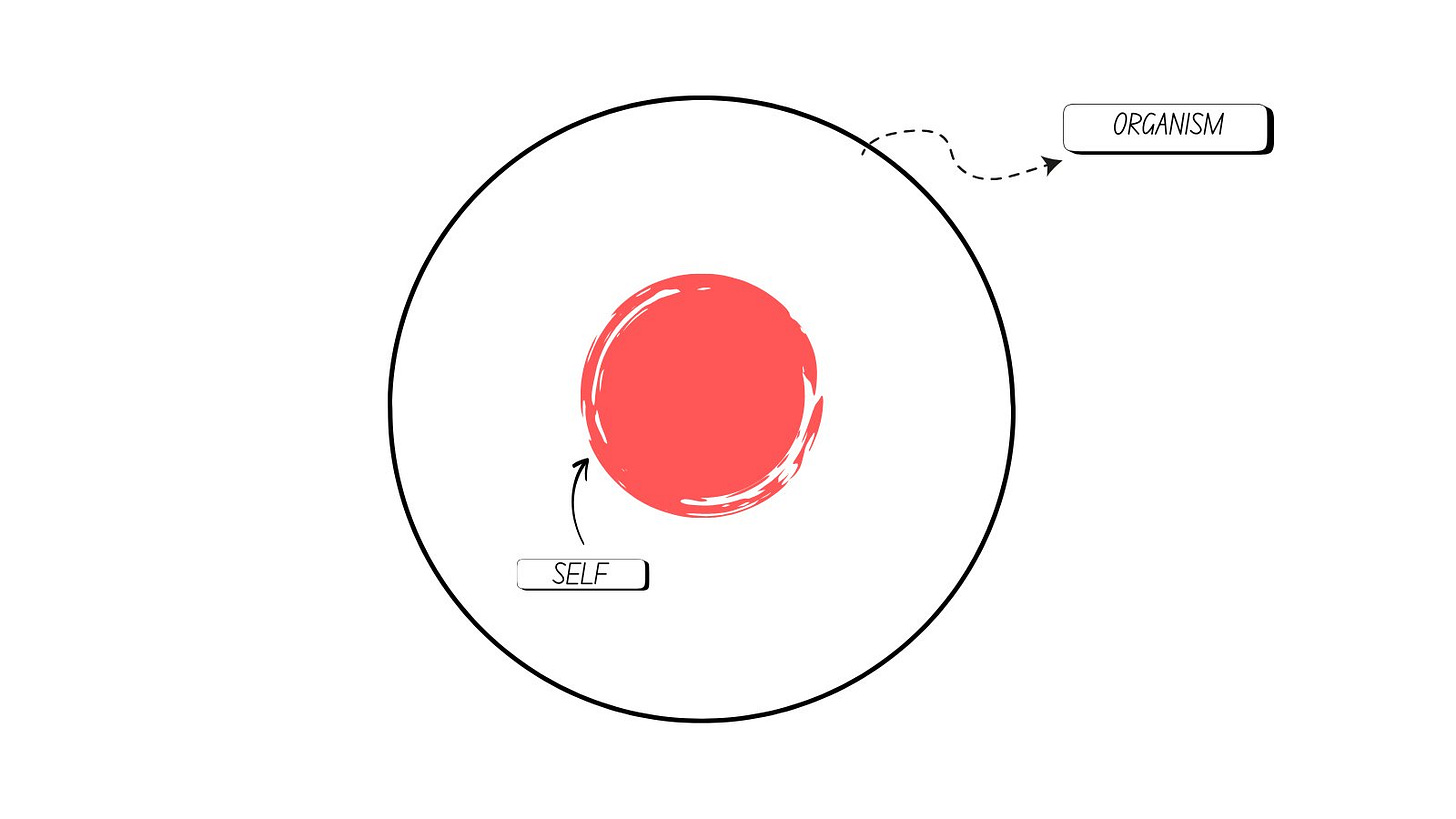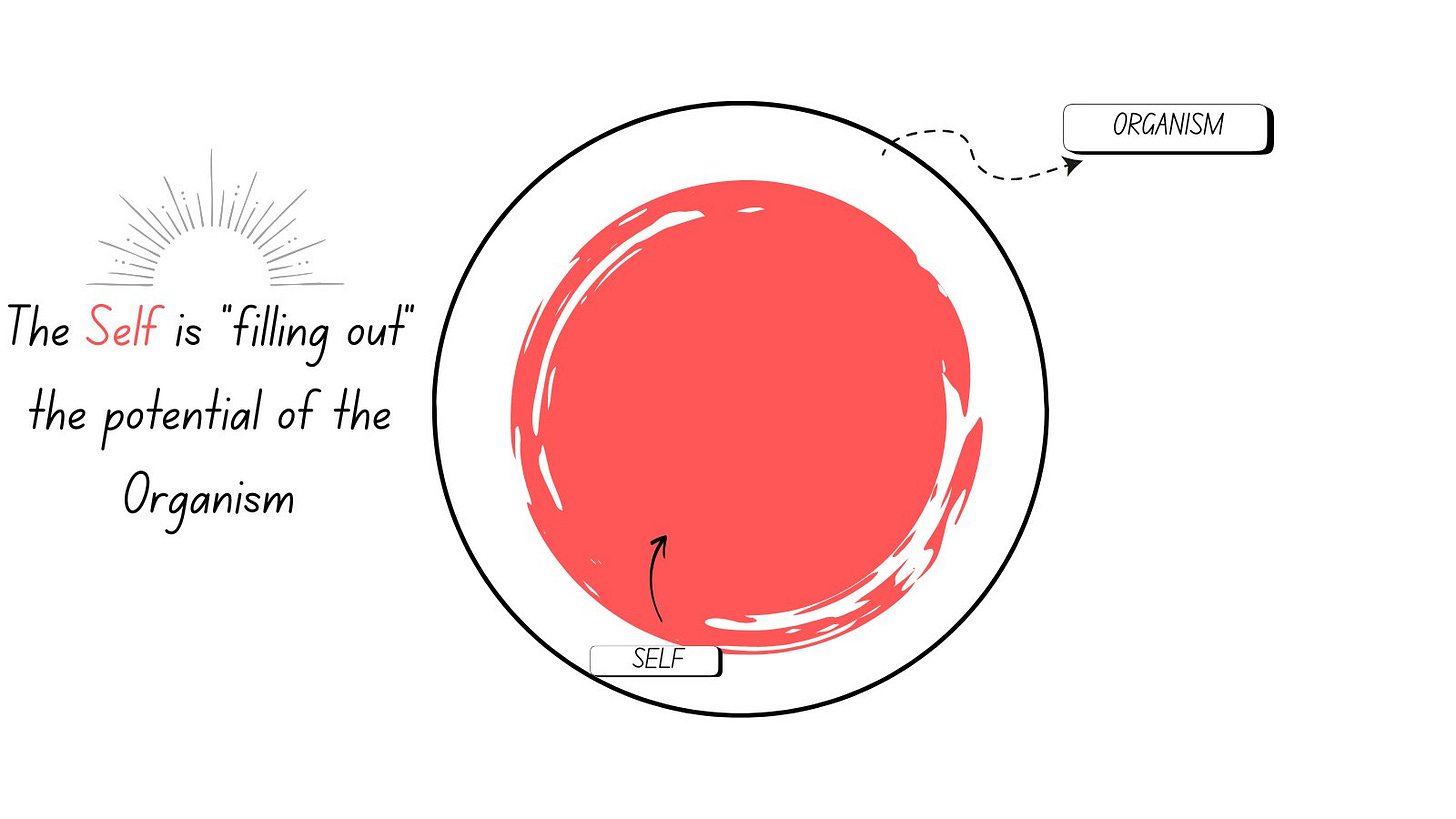If you think of the Self1 as a sensation that arises out of the interaction between our mental movements, perceptions, stored memories, and genetic predisposition, then the Self is but a part growing inside the vessel of the Organism. Does that make it less real? No.
But it does point to the reality that not everyone has a fully developed Self. It grows or shrinks in relationship to internal and external conditions that influence its direction and trajectory, as well as the rate of regeneration and decay. These conditions can either motivate or prevent the expansion of the Self; repress or manifest the natural proclivity of fulfilling the potential of the Organism; that is to say, the Self exists as a condensed mass of emergent capacity and becoming that await a Big Bang (or many Small Bangs) to spread and populate the surface area of your allotted existence.
The Automation
Your birth means the manifestation of your Organism. Everything that you could possibly become, feel, or do is encoded in that massive, yet finite, blueprint.
You live the first few weeks of your life as an automation that only reacts and passively absorbs. But slowly, an internal ordering begins. Having an “agent” with the ability to interact and intent is quite useful for the survival and procreation of the Organism. In the beginning, it’s small, it only covers some basic proclivities and preferences, the colors you like, the sounds you despise, the food you prefer but as you grow older, reality opens up, and the Self begins to grow more into the Organism, exploring and discovering.
If you grown up in a healthy environment, with emotionally stable and supportive parents, then the Self will continue to expand, covering more and more, essentially becoming one. In this case, we can say that the S+O are in alignment since their motivations overlap almost perfectly; the Self wants to fulfill the potential of the Organism.
But if your environment doesn’t nurture your innate potential and desires, then the Self will retreat.
The Burden of Being a Social Creature
Due to the circumstances of its creation, the Self wants one thing: to be liked. It is primary and evolutionary to “fit in” and perpetuate tribal cohesiveness2. That creates two scenarios:
Your environment values the nature of the Organism. The Self is happy to continue filling out the Organism because it gets the validation it requires to feel safe and satisfied.
The environment goes against the nature of the Organism. In this case, we have a problem.
If you’re lucky, your family, friends, and community will accept and make use of your talents. Your desires will be embraced and satisfied effortlessly.
If, however, you belong to the majority of people, your family, friends, and community will resist the desires of the Organism. Someone destined to be a great surfer will struggle if they grow up in North Dakota. I’m sure you can think of more severe examples that involve other people, authoritative figures, religious dogma, etc.
The Self must make a choice; overcome and expand, or shrink
This overcoming is quite natural and useful for it functions as the whetstone for the Self. But when our primary caregivers go against the Organism, then the Self is in deep waters:
We want others to like us but mostly because we want to like ourselves. When we are kids, our parents liking us is what makes us "good" and good is what makes us like ourselves. So what THEY don't like, we believe that we don't like when we reach adulthood.
Can you see how your parents rejecting your talent, desire, potential can stunt your development?
If you want to be a dancer and your father hates dancing, since he’s the sole moral authority in your life it must mean that desiring to be a dancer is a sin. So, the Self must retreat from the Organism, because the latter contains the very thing that makes someone immoral: desire.
Forming an Identity (How the Self applies values in the world)
Many of the developmental stages we go through are attempts at establishing an identity3 in relationship to our environment. We struggle to flesh out who we are (Self), first and foremost, but then we also struggle to apply our values in the world. We all go through phases of rebellion, certainly during our teenage years, just so we can test how reality will respond to our values, but even beyond that stage we’re under constant pressure to assert ourselves, claiming the right to exist.
If your formative years are defined by acceptance of your values, then your identity will wrap around a pattern of safety, nurturing, and recognition.
If the moral authorities in your life reject you (the Organism) from day one, your expectations will shift accordingly and you might spend decades either living a false life or struggling to understand why following your heart feels immoral.
The identity you end up with is by no means permanent. I like to think of it as a wounded part of you that you need to carry with you until it either dies or heals.
Privation
When a nurturing environment doesn’t exist, we must cultivate the ability to accept ourselves when others don't, despite the initial negative reaction. Without that ability, we’re deprived of soulful nutrition and the Organism will wither away.
Even the awareness that all of this is happening seems to help people see more clearly and start making more decisions toward their true nature (what’s true anyway?). Or, at the very least, realize that our compass is screwed and getting in contact with what feels good, even if it feels awkward4, is the right direction.
Having noself5 is often touted as one of the highest spiritual attainments, a key realization on the path toward enlightenment. That might be true, I wouldn’t know, but in my opinion you can’t let go of something you don’t already have. Possessing a healthy Self, in alignment with the Organism, acting through a stable identity is psychologically sound and a prerequisite for a good life. Suppressing and shrinking the Self so one doesn’t suffer is a trauma response to reality itself.
Conclusion
In Taoist traditions, the Ming is a point in your lower back related to your destiny. It is said that if your health is great and your Ming is open, then your life path unfolds naturally in front of you. On the contrary, if your health suffers and your lower back is always stiff and achy, you aren’t fulfilling your destiny.
Destiny in this context is the potential of the Organism. The Ming could be viewed as the beginning of the Self, the very thing that creates a path that lets you live according to your higher ideals.
Achieving Ziran, naturalness, requires alignment of S+O and eventually full integration. At this point, you know what you truly desire (your values) and you’ve created a reality (identity and environment) that nurtures you. Similar to the Jungian perspective of integrating the Shadow.
Many of the ideas in this essay come from Carl Roger’s psychoanalytic philosophy. I hope you enjoyed reading my spin on it.
Metaphysical ontology aside, my definition for this essay is closer to that of the Ego than that of the Atman.
On the other hand, the Organism really doesn’t give a fuck.
Earmark these concepts:
The Organism is your raw potential—your natural tendencies, abilities, and desires, encoded at birth.
The Self is the agent that emerges from within the Organism: a developing center of awareness, intention, and personality.
As the Self grows, it begins to form an Identity—the structure through which it expresses itself and interacts with the world. This identity is shaped by how the Self learns to navigate external approval and internal truth.
Values are the principles and desires that the Self holds as meaningful—either adopted through conditioning or discovered through alignment with the Organism’s deeper nature. When identity and values harmonize, the Self thrives; when they’re in conflict, the Self retreats or fractures.
*True desires = values
*Identity (relationship between Self and Organism) + external environment = your reality
Feeling good after you do something is a better marker of progress than doing things that just feel good in the moment.
At least in Buddhist circles.










How do you know if what you desire is in accordance with your Self? You provide the most benevolent possible scenario but how to account for people who are mistaken or pathological or even demonically possessed? (Even Jung accounted for cases of demonic possession)
For instance, in your example how does the child know he truly desires to be a dancer? Could it also be that the child desires something *else* but only sees a possible way to manifest that deeper desire as a dancer when it could manifest in a multitude of other ways? It is true that sometimes society can be authoritative, rigid and tyrannical wrongly. But what of the case of society keeping people from degenerating, shrinking, frittering away their time and wasting their potential in unhealthy outlets? This would be the Organism confusing "Self Expression" instead with some degenerate, false desire or pleasure. Religious dogma can sometimes be taken too literally and misapplied of course, but what about the case where morality protects both the individual and group/society?
Thanks for the article. I enjoyed reading.
Thank you! Also, who made that beautiful illustration with the trees?